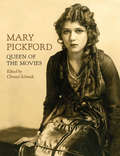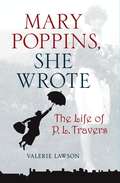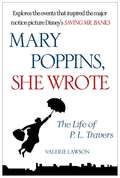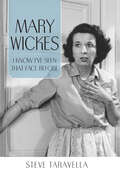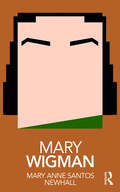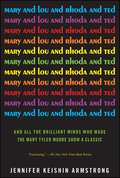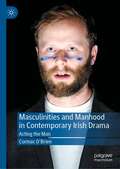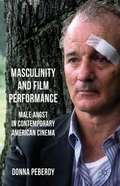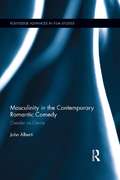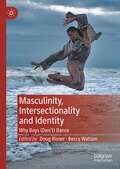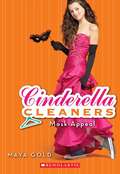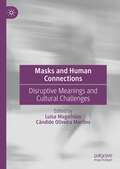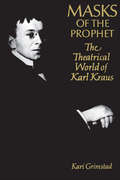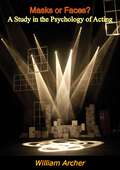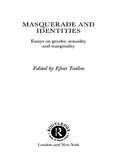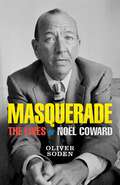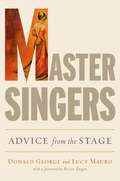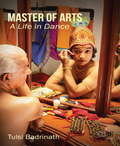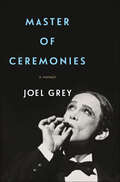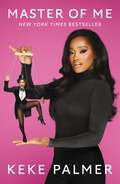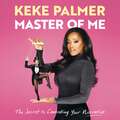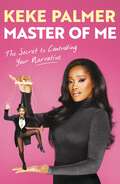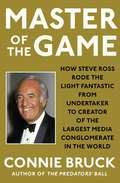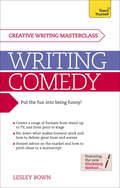- Table View
- List View
Mary Pickford: Queen of the Movies
by Christel Schmidt&“Explains Pickford&’s roles as not only a talented actress, but also as a philanthropist and industry leader who managed to end up her own producer.&” —Time Out In the early days of cinema, when actors were unbilled and unmentioned in credits, audiences immediately noticed Mary Pickford. Moviegoers everywhere were riveted by her magnetic talent and appeal as she rose to become cinema&’s first great star. In this engaging collection, co-published with the Library of Congress, an eminent group of film historians sheds new light on this icon&’s incredible life and legacy. Pickford emerges from the pages in vivid detail, revealed as a gifted actress, a philanthropist, and a savvy industry leader who fought for creative control of her films and ultimately became her own producer. With extensive photos and illustrations, this book paints a fascinating portrait of a key figure in American cinematic history. Includes over 200 photos, illustrations, and stills from the collections of the Library of Congress and Academy of Motion Picture Arts and Sciences
Mary Poppins, She Wrote
by Valerie LawsonThe remarkable life of P.L. Travers, the creator of Mary Poppins.An arresting life...Lawson is superb at excavating the details. -Library Journal The spellbinding stories of Mary Poppins, the quintessentially English and utterly magical nanny, have been loved by generations. She flew into the lives of the unsuspecting Banks family in a children's book that was instantly hailed as a classic, then became a household name when Julie Andrews stepped into the title role in Walt Disney's hugely successful and equally classic film. But the Mary Poppins in the stories was not the cheery film character. She was tart and sharp, plain and vain. She was a remarkable character. The story of Mary Poppins' creator, as this definitive biography reveals, is equally remarkable. The fabulous English nanny was actually conceived by an Australian, Pamela Lyndon Travers, who came to London in 1924 from Queensland as a journalist. She became involved with Theosophy, traveled in the literary circles of W.B. Yeats and T.S. Eliot, and became a disciple of the famed spiritual guru, Gurdjieff. She famously clashed with Walt Disney over the adaptation of the Mary Poppins books into film. Travers, whom Disney accused of vanity for "thinking you know more about Mary Poppins than I do," was as tart and opinionated as Julie Andrews's big-screen Mary Poppins was cheery. Yet it was a love of mysticism and magic that shaped Travers's life as well as the character of Mary Poppins. The clipped, strict, and ultimately mysterious nanny who emerged from her pen was the creation of someone who remained inscrutable and enigmatic to the end of her ninety-six years. Valerie Lawson's illuminating biography provides the first full look whose personal journey is as intriguing as her beloved characters.
Mary Poppins, She Wrote: The Life of P. L. Travers
by Valerie LawsonTHE ONLY TRUE STORY BEHIND THE CREATOR OF MARY POPPINS The remarkable life of P.L. Travers, the creator of Mary Poppins—perfect for fans of the movie Mary Poppins Returns and the original Disney classic! &“An arresting life…Lawson is superb at excavating the details.&” —Library JournalThe spellbinding stories of Mary Poppins, the quintessentially English and utterly magical nanny, have been loved by generations. She flew into the lives of the unsuspecting Banks family in a children&’s book that was instantly hailed as a classic, then became a household name when Julie Andrews stepped into the title role in Walt Disney&’s hugely successful and equally classic film. But the Mary Poppins in the stories was not the cheery film character. She was tart and sharp, plain and vain. She was a remarkable character. The story of Mary Poppins&’ creator, as this definitive biography reveals, is equally remarkable. The fabulous English nanny was actually conceived by an Australian, Pamela Lyndon Travers, who came to London in 1924 from Queensland as a journalist. She became involved with Theosophy, traveled in the literary circles of W.B. Yeats and T.S. Eliot, and became a disciple of the famed spiritual guru, Gurdjieff. She famously clashed with Walt Disney over the adaptation of the Mary Poppins books into film. Travers, whom Disney accused of vanity for &“thinking you know more about Mary Poppins than I do,&” was as tart and opinionated as Julie Andrews&’s big-screen Mary Poppins was cheery. Yet it was a love of mysticism and magic that shaped Travers&’s life as well as the character of Mary Poppins. The clipped, strict, and ultimately mysterious nanny who emerged from her pen was the creation of someone who remained inscrutable and enigmatic to the end of her ninety-six years. Valerie Lawson&’s illuminating biography provides the first full look whose personal journey is as intriguing as her beloved characters.
Mary Wickes: I Know I've Seen That Face Before (Hollywood Legends Series)
by Steve TaravellaMoviegoers know her as the housekeeper in White Christmas, the nurse in Now, Voyager, and the crotchety choir director in Sister Act. This book, filled with never-published behind-the-scenes stories from Broadway and Hollywood, chronicles the life of a complicated woman who brought an assortment of unforgettable nurses, nuns, and housekeepers to life on screen and stage. Wickes (1910–1995) was part of some of the most significant moments in film, television, theatre, and radio history. On that frightening night in 1938 when Orson Welles recorded his earth-shattering “War of the Worlds” radio broadcast, Wickes was waiting on another soundstage for him for a rehearsal of Danton's Death, oblivious to the havoc taking place outside. When silent film star Gloria Swanson decided to host a live talk show on this new thing called television, Wickes was one of her first guests. When Lucille Ball made one of her first TV appearances, Wickes appeared with her—and became Lucy's closest friend for more than thirty years. Wickes was the original Mary Poppins, long before an umbrella carried Julie Andrews across the rooftops of London. And when Disney began creating 101 Dalmatians, Wickes was asked to pose for animators trying to capture the evil of Cruella De Vil. The pinched-face actress who cracked wise by day became a confidante to some of the day's biggest stars by night, including Bette Davis and Doris Day. Bolstered by interviews with almost three hundred people, and by private correspondence from Ball, Davis, Day, and others, Mary Wickes: I Know I've Seen That Face Before includes scores of never-before-shared anecdotes about Hollywood and Broadway. In the process, it introduces readers to a complex woman who sustained a remarkable career for sixty years.
Mary Wigman: Modernity And Mary Wigman, 1886--1973 (Routledge Performance Practitioners)
by Mary Anne Santos NewhallThis book considers dancer, teacher, and choreographer Mary Wigman, a leading innovator in Expressionist dance whose radical explorations of movement and dance theory are credited with expanding the scope of dance as a theatrical art. Now reissued, this book combines: a full account of Wigman’s life and work an analysis of her key ideas detailed discussion of her aesthetic theories, including the use of space as an "invisible partner" and the transcendent nature of performance a commentary on her key works, including Hexentanz and The Seven Dances of Life an extensive collection of practical exercises designed to provide an understanding of Wigman’s choreographic principles and her uniquely immersive approach to dance. As a first step towards critical understanding, and as an initial exploration before going on to further, primary research, Routledge Performance Practitioners are unbeatable value for today’s student.
Mary and Lou and Rhoda and Ted
by Jennifer Keishin ArmstrongThe story of the making of a classic and groundbreaking TV show, as experienced by its producers, writers, and cast. Mary Tyler Moore made her name as Dick Van Dyke's wife on the eponymous show, a cute, unassuming housewife that audiences loved. But when her writer/producers James Brooks and Allan Burnes dreamed up an edgy show about a divorced woman with a career, network executives replied: "Americans won't watch television about New York City, divorcees, men with mustaches, or Jews." But Moore and her team were committed, and when the show finally aired, in spite of tepid reviews, fans loved it. Jennifer Armstrong introduces readers to the show's creators; its principled producer, Grant Tinker; and the writers and actors who attracted millions of viewers. As the first situation comedy to employ numerous women as writers and producers, The Mary Tyler Moore Show became a guiding light for women in the 1970s. The show also became the centerpiece of one of greatest evenings of comedy in television history, and Jennifer Armstrong describes how the television industry evolved during these golden years.
Masculinities and Manhood in Contemporary Irish Drama: Acting the Man
by Cormac O'BrienThis book charts the journey, in terms of both stasis and change, that masculinities and manhood have made in Irish drama, and by extension in the broader culture and society, from the 1960s to the present. Examining a diverse corpus of drama and theatre events, both mainstream and on the fringe, this study critically elaborates a seismic shift in Irish masculinities. This book argues, then, that Irish manhood has shifted from embodying and enacting post-colonial concerns of nationalism and national identity, to performing models of masculinity that are driven and moulded by the political and cultural practices of neoliberal capitalism. Masculinities and Manhood in Contemporary Irish Drama charts this shift through chapters on performing masculinity in plays set in both the Irish Republic and Northern Ireland, and through several chapters that focus on Women’s and Queer drama. It thus takes its readers on a journey: a journey that begins with an overtly patriarchal, nationalist manhood that often made direct comment on the state of the nation, and ultimately arrives at several arguably regressive forms of globalised masculinity, which are couched in misaligned notions of individualism and free-choice and that frequently perceive themselves as being in crisis.
Masculinities and the Culture of Competitive Cycling (Palgrave Studies in Masculinity, Sport and Exercise)
by Jack HardwickeDrawing on extensive ethnographic, qualitative and quantitative research, this monograph provides a novel account of masculinities in an individual sport: competitive road cycling. Chapters present varied analyses on male cyclists’ relationship with masculinity, the culture of competitive road cycling, cyclists’ attitudes toward injury management, sexual minority and women’s experiences in the sport, and autoethnographic accounts of the author’s own experiences of being involved in the sport for over ten years. The author also examines how masculinity impacts male cyclists’ attitudes towards competition, risk taking and doping practices. This book will be of interest to scholars and researchers in sports sociology, gender studies, and masculinity studies.
Masculinity and Film Performance
by Donna PeberdyMasculinity and Film Performance is a lively and engaging study of the complex relationship between masculinity and performance on and off screen, focusing on the performance of 'male angst' in American film and popular culture during the 1990s and 2000s. Building on theories of film acting, masculinity, performance, and cultural studies, this book establishes a framework for studying screen masculinity and provides close analysis of a range of performers and performance styles. It also examines the specific social, cultural, historical and political contexts that have shaped and affected the performance of masculinity on screen, such as the aging of the baby boom and the launch of Viagra onto the marketplace, the 'Iron John' and 'Wild Man' phenomenon, and the racially marked fatherhood crisis. Drawing from an array of illuminating film and actor case studies, including Bill Murray, Tom Cruise, Michael Douglas, Will Smith, William H. Macy, Denzel Washington, Broken Flowers, Far From Heaven, Pleasantville, Magnolia, and Wonder Boys, Donna Peberdyoffers a significant contribution to the emerging field of screen performance studies. "
Masculinity in the Contemporary Romantic Comedy: Gender as Genre (Routledge Advances in Film Studies #24)
by John AlbertiThis volume addresses the growing obsolescence of traditional constructions of masculine identity in popular romantic comedies by proposing an approach that combines gender and genre theory to examine the ongoing radical reconstruction of gender roles in these films. Alberti creates a unified theory of gender role change in the movies that combines the insights of both poststructuralist gender and narrative genre theory, avoiding binary approaches to the study of gender representation. He establishes the current "crises" in both gender representation and genre development within romantic comedies as examples of experimentation and change towards narratives that feature more egalitarian and less essentialist constructions of gender.
Masculinity, Intersectionality and Identity: Why Boys (Don’t) Dance
by Beccy Watson Doug RisnerThis unparalleled collection, international and innovative in scope, analyzes the dynamic tensions between masculinity and dance. Introducing a lens of intersectionality, the book’s content examines why, despite burgeoning popular and contemporary representations of a normalization of dancing masculinities, some boys don’t dance and why many of those who do struggle to stay involved. Prominent themes of identity, masculinity, and intersectionality weave throughout the book’s conceptual frameworks of education and schooling, cultures, and identities in dance. Incorporating empirical studies, qualitative inquiry, and reflexive accounts, Doug Risner and Beccy Watson have assembled a unique volume of original chapters from established scholars and emerging voices to inform the future direction of interdisciplinary dance scholarship and dance education research. The book’s scope spans several related disciplines including gender studies, queer studies, cultural studies, performance studies, and sociology. The volume will appeal to dancers, educators, researchers, scholars, students, parents, and caregivers of boys who dance. Accessible at multiple levels, the content is relevant for undergraduate students across dance, dance education, and movement science, and graduate students forging new analysis of dance, pedagogy, gender theory, and teaching praxis.
Mask Appeal (Cinderella Cleaners)
by Maya GoldDiana can't believe it when she's invited to a fancy masquerade ball. Luckily, she has the great resource of the No-Pickup rack at Cinderella Cleaners, where she can find the perfect ball gown--and mask! On the night of the ball, however, she meets her movie-star crush--and has to decide if she should hide behind her disguise, or reveal the real Diana.
Masks and Human Connections: Disruptive Meanings and Cultural Challenges
by Luísa Magalhães Cândido Oliveira MartinsThis interdisciplinary collection explores four distinct perspectives about the mask, as object of use for protection, identity, and disguise. In part I, contributors address human identities within collective social performance, with chapters on performativity and the far right and masked identities in political resistance and communication. Part II focuses on the mask as a signifying object with strong representational challenges, exploring representations in festivals, literature, and film. Part III investigates the ambiguous use of the mask as a protective and concealing element, delving into visual culture and digital social media contexts. Finally, Part VI draws on the work of Levinas and Deleuze to investigate a philosophical view of the mask that addresses memory and ethics within intersubjective relationships. Questioning the contemporary world, using communication, sociology, visual culture, and philosophical theory, the volume provides a pedagogical and formative perspective on the mask.
Masks of the Prophet: The Theatrical World of Karl Kraus
by Karl Grimstad'When the name "Hitler" is mentioned, nothing occurs to me' – so said Karl Kraus. For this leading Viennese Jewish critic and intellectual the touchstone of art was ethics. How could he be speechless in the face of a threat to all that ethics means? To answer this question, the author makes a detailed chronological study of Kraus's intellectual activity as reflected in his work on the theatre. The results are presented in five chapters, each dealing with a different 'mask' adopted by Kraus during the period 1892-1936. Grimstad considers not only theatre and drama criticism in Die Fackel and Kraus's dramatic writings, but also biographical data, to help uncover the rationale of his work. That rationale is the logic of the theatrical mode in which he lived and wrote. The stage was not only his subject matter, it determined what he would see and say. Grimstad argues that when Kraus wrote, his words were the speech of an 'actor' who was often infatuated with himself and obsessed with the need to overwhelm his rival 'actors.' When Hitler's storm-troopers began their march, he could say nothing for the world in which his thought took shape had become a world of theatrics, not 'Realpolitik.' Kraus criticized plays without reading them and performances without seeing them, obsessed with the belief that his was the voice of all that was true, good, and beautiful. Grimstad observes that he was a prophet who confused the divine inspiration with the Thespian urge, playing to an audience, using a mask for each of his roles, yet thinking he spoke to all mankind, bringing them pure ethos. This volume will be of particular interest to those working in the fields of theatre criticism, comparative literature, German literature, and Jewish intellectual history.
Masks or Faces?: A Study in the Psychology of Acting
by William Archer"Masks or Faces?: A Study in the Psychology of Acting" by William Archer is a seminal work that delves into the intricate world of acting, exploring the delicate balance between an actor's external performance and their internal psychological processes. Archer, a renowned theatre critic and playwright, provides a thorough analysis of the art and craft of acting, addressing the age-old question of whether actors genuinely experience the emotions they portray or merely simulate them.In this groundbreaking study, Archer examines various theories and techniques of acting, drawing on his extensive knowledge of theatre history and his keen observations of performances. He discusses the methods employed by different acting schools, from the classical traditions to the emerging naturalistic styles of his time. By dissecting the techniques of notable actors and their ability to convey authentic emotions, Archer provides readers with a comprehensive understanding of the psychological underpinnings of effective acting."Masks or Faces?" also explores the concept of the actor's dual identity—the mask they wear on stage versus their true self. Archer delves into the psychological impact of this duality on actors, considering how their craft influences their personal identities and emotional well-being. Through insightful anecdotes and critical analysis, he sheds light on the complexities of an actor's life, both on and off the stage.This book is an essential read for students of theatre, actors, directors, and anyone interested in the psychology of performance. Archer's eloquent writing and profound insights make "Masks or Faces?" a timeless exploration of the fascinating interplay between reality and illusion in the world of acting. It remains a vital resource for understanding the psychological depth required to bring characters to life and the enduring question of whether actors truly live the emotions they portray or skillfully craft an illusion for their audience.
Masquerade and Identities: Essays on Gender, Sexuality and Marginality
by Efrat TseëlonMasquerade, both literal and metaphorical, is now a central concept on many disciplines. This timely volume explores and revisits the role of disguise in constructing, expressing and representing marginalised identities, and in undermining easy distinctions between 'true' identity and artifice.The book is interdisciplinary in approach, spanning a diverse range of cultures and narrative voices. It provides provocative and nuanced ways of thinking about masquerade as a tool for construction, and a tool for critique. The essays interrogate such themes as:*mask and carnival*fetish fashion*stigma of illegitimacy*femininity as masquerade*lesbian masks*cross-dressing in Jewish folk theatre*the mask in seventeenth and eighteenth century London and nineteenth century France*the voice as mask.
Masquerade: The Lives of Noël Coward
by Oliver Soden'This is the biography - truthful, sympathetic and thorough - that Coward deserves'DAILY TELEGRAPHThe voice, the dressing-gown, the cigarette in its holder, remain unmistakable. There is rarely a week when one of Private Lives, Hay Fever, and Blithe Spirit is not in production somewhere in the world. Phrases from Noël Coward's songs - "Mad About The Boy", "Mad Dogs and Englishman" - are forever lodged in the public consciousness. He was at one point the most highly paid author in the world. Yet some of his most striking and daring writing remains unfamiliar. As T.S. Eliot said, in 1954, "there are things you can learn from Noël Coward that you won't learn from Shakespeare".Coward wrote some fifty plays and nine musicals, as well as revues, screenplays, short stories, poetry, and a novel. He was both composer and lyricist for approximately 675 songs. Louis Mountbatten's famous tribute argued that, while there were greater comedians, novelists, composers, painters and so on, only "the master" had combined fourteen talents in one. So central was he to his age's theatre that any account of his career is also a history of the British stage. And so daring was Coward's unorthdoxy in his closest relationships, obliquely reflected throughout his writing, that it must also be a history of sexual liberation in the twentieth century. In Oliver Soden's sparkling, story-packed new Life, the Master finally gets his due.
Master Singers: Advice From the Stage
by Donald George Lucy MauroThe book provides vocalists making the transition from student to professional with advice on matters ranging from technique and its practical application for effective stage projection to the practicalities of the business of professional singing.
Master of Arts: A Life in Dance
by Tulsi BadrinathV.P. Dhananjayan was one of the first men to make a successful career as a Bharata Natyam dancer. In the late sixties, when he made this choice, Bharata Natyam ? the classic dance form that Rukmini Devi helped evolve from the dance of the devadasis ? was almost exclusively the domain of women. In making Bharata Natyam his profession, Dhananjayan had to create a space for his dance where none existed. It is only recently, in the relatively short span of the past seventy years, and to a great extent because of the creative efforts of versatile and innovative dancers like Dhananjayan, that greater number of men have performed Bharata Natyam as men, without needing to dress as women to appear on stage. As Dhananjayan?s student for nearly forty years now, and a trained dancer herself, the author, Tulsi Badrinath, chronicles the story of his brilliant life in dance with the insight of one who understands each nuance of it. Weaving her own life-long passion for Bharata Natyam with his remarkable story, she brings to light the difficulties faced by a male dancer in establishing himself in what was thought to be a somewhat unrespectable profession, and tells the compelling story of his life with empathy and understanding. Writing of his years in Kalakshetra and his departure from it; of the deep love that blossomed between him and his wife, Shanta, and the incredible dance partnership they forged, making them famous as The Dhananjayans; of his international collaborations with Ravi Shankar; and of his ability, as guru and teacher, to impart his passion for dance to his disciples, she explores her own understanding of what the dance, and her guru, have meant to her. Interspersing this remarkable tale of guru and shishya with the stories of other young male dancers in the realm of Bharata Natyam, she pays tribute to their extraordinary commitment, their talent and their courage.
Master of Ceremonies: A Memoir
by Joel GreyJoel Grey, the Tony and Academy Award-winning Master of Ceremonies in Cabaret finally tells his remarkable life story. Born Joel David Katz to a wild and wooly Jewish American family in Cleveland, Ohio in 1932, Joel began his life in the theater at the age of 9, starting in children’s theater and then moving to the main stage. He was hooked, and his seven decades long career charts the evolution of American entertainment - from Vaudeville performances with his father, Mickey Katz to the seedy gangster filled nightclubs of the forties, the bright lights of Broadway and dizzying glamour of Hollywood, to juggernaut musicals like Cabaret, Chicago, and Wicked. Master of Ceremonies is a memoir of a life lived in and out of the limelight, but it is also the story of the man behind the stage makeup. Coming of age in a time when being yourself tended to be not only difficult but also dangerous, Joel has to act both on and off the stage. He spends his high school years sleeping with the girls-next-door while carrying on a scandalous affair with an older man. Romances with to-die-for Vegas Showgirls are balanced with late night liaisons with like-minded guys, until finally Joel falls in love and marries a talented and beautiful woman, starts a family, and has a pretty much picture perfect life. But 24 years later when the marriage dissolves, Joel has to once again find his place in a world that has radically changed. Drawing back the curtain on a career filled with show-stopping numbers, larger-than-life stars and even singing in the shower with Bjork, Master of Ceremonies is also a portrait of an artist coming to terms with his evolving identity. When an actor plays a character, he has to find out what makes them who they are; their needs, dreams, and fears. It’s a difficult thing to do, but sometimes the hardest role in an actor’s life is that of himself. Deftly capturing the joy of performing as well as the pain and secrets of an era we have only just started to leave behind, Joel’s story is one of love, loss, hard-won honesty, redemption, and success.
Master of Me: The Secret to Controlling Your Narrative
by Keke PalmerINSTANT NEW YORK TIMES BESTSELLER <p>From the award-winning, multihyphenate global entertainer Keke Palmer comes the inspiring true story of her journey to understanding her genuine value. A MOST ANTICIPATED BOOK OF FALL 2024: Bookshop, Apple Books, People, BookRiot, and more!! Keke Palmer thought she knew who she was. What it means to be a good person and what it takes to be a success. It all seemed so simple, until she realized the challenges she would have to face to prove to herself who she wanted to be. From feeling alienated to having to restart her career after ten years in to becoming a single mother just months after her son was born—everything she worked for in life that she felt granted her what she wanted now also reminded her that “life is going to life” and throw curveballs regardless of what you deserve. She found herself asking, Where do I find my power? How do I master myself? In her own raw and intimate words, Keke talks about everything from her struggles with boundaries to unconditional love, forgiveness, and worthiness. “Don’t block your blessings and potential opportunities by allowing the voices of other people to influence your actions,” she says. “How you’re choosing to set yourself up for success is between you and the person looking back at you in the mirror.” Throughout the book, Keke also poses readers with the questions needed to get them through their own challenging times by sharing personal stories and lessons she’s learned along the way. She gets candid about the tools she’s developed to take the reins, harness her vulnerability, and recognize ownership in the narrative of her life—which allowed her to turn personal power into major power. In this exhilarating, deeply poignant, and often laugh-out-loud book, Lauren Keyana Palmer gets real about life, work, love, and belief. These pages will encourage readers to empower themselves with the truth, leverage their currency, and find the keys to master themselves and the art of alchemy. Keke writes, “You are not on anyone else’s timeline, only your own.” The result is a tour de force. They said, “Jack of all Trades, Master of None.” She said, “No, I am the Master. Of Me.” <br><b>New York Times Bestseller</b></br>
Master of Me: The Secret to Controlling Your Narrative from Award-Winning Actress and Entertainer
by Keke PalmerFrom the award-winning, multihyphenate global entertainer Keke Palmer comes the inspiring true story of her journey to understanding her genuine value.A MOST ANTICIPATED BOOK OF AUTUMN 2024: Bookshop, Apple Books, and more!!Keke Palmer thought she knew who she was. What it means to be a good person and what it takes to be a success. It all seemed so simple, until she realized the challenges she would have to face to prove to herself who she wanted to be. From feeling alienated to having to restart her career after ten years in to becoming a single mother just months after her son was born―everything she worked for in life that she felt granted her what she wanted now also reminded her that "life is going to life" and throw curveballs regardless of what you deserve. She found herself asking, Where do I find my power? How do I master myself?In her own raw and intimate words, Keke talks about everything from her struggles with boundaries to unconditional love, forgiveness, and worthiness. "Don't block your blessings and potential opportunities by allowing the voices of other people to influence your actions," she says. "How you're choosing to set yourself up for success is between you and the person looking back at you in the mirror."Throughout the book, Keke also poses readers with the questions needed to get them through their own challenging times by sharing personal stories and lessons she's learned along the way. She gets candid about the tools she's developed to take the reins, harness her vulnerability, and recognize ownership in the narrative of her life―which allowed her to turn personal power into major power.In this exhilarating, deeply poignant, and often laugh-out-loud book, Lauren Keyana Palmer gets real about life, work, love, and belief. These pages will encourage readers to empower themselves with the truth, leverage their currency, and find the keys to master themselves and the art of alchemy. Keke writes, "You are not on anyone else's timeline, only your own."The result is a tour de force.They said, "Jack of all Trades, Master of None."She said, "No, I am the Master. Of Me.""Imposter" was produced by: Kenneth "KP" Paige & B HAM. It was written by Kenneth Dickerson Taylor, Jr., Lauren Palmer, Marcus Lomax, Nathalia Marshall, and Brandon Hamlin. Musicians: Kenneth "KP" Paige (keyboards, synth bass); B HAM (drum programming) Mixed by: Gela Akhalaia Recording Engineer: Kory Welty Mastered by: Sing Mastering
Master of Me: The Secret to Controlling Your Narrative from Award-Winning Actress and Entertainer
by Keke PalmerFrom the award-winning, multihyphenate global entertainer Keke Palmer comes the inspiring true story of her journey to understanding her genuine value.A MOST ANTICIPATED BOOK OF AUTUMN 2024: Bookshop, Apple Books, and more!!Keke Palmer thought she knew who she was. What it means to be a good person and what it takes to be a success. It all seemed so simple, until she realized the challenges she would have to face to prove to herself who she wanted to be. From feeling alienated to having to restart her career after ten years in to becoming a single mother just months after her son was born―everything she worked for in life that she felt granted her what she wanted now also reminded her that "life is going to life" and throw curveballs regardless of what you deserve. She found herself asking, Where do I find my power? How do I master myself?In her own raw and intimate words, Keke talks about everything from her struggles with boundaries to unconditional love, forgiveness, and worthiness. "Don't block your blessings and potential opportunities by allowing the voices of other people to influence your actions," she says. "How you're choosing to set yourself up for success is between you and the person looking back at you in the mirror."Throughout the book, Keke also poses readers with the questions needed to get them through their own challenging times by sharing personal stories and lessons she's learned along the way. She gets candid about the tools she's developed to take the reins, harness her vulnerability, and recognize ownership in the narrative of her life―which allowed her to turn personal power into major power.In this exhilarating, deeply poignant, and often laugh-out-loud book, Lauren Keyana Palmer gets real about life, work, love, and belief. These pages will encourage readers to empower themselves with the truth, leverage their currency, and find the keys to master themselves and the art of alchemy. Keke writes, "You are not on anyone else's timeline, only your own."The result is a tour de force.They said, "Jack of all Trades, Master of None."She said, "No, I am the Master. Of Me."
Master of the Game: Steve Ross and the Creation of Time Warner
by Connie BruckFrom the best-selling author of The Predators' Ball comes the story of the most flamboyant businessman and dealmaker of his generation, Steve Ross. When Steven Spielberg first heard Steve Ross tell his life story, it was such a dramatic rags-to-riches narrative that he thought it was a movie. In a career that started in Brooklyn and spanned Wall Street, Hollywood, and the Mafia, Steve Ross took his father-in-law's funeral business and a parking lot company and grew them into the largest media and entertainment company in the world, Time Warner. In the upper strata of American business that Ross reached before his death, he was an anomaly. Outrageous, glamorous, charismatic, he presided over an enterprise that was more medieval fiefdom than corporate bureaucracy. He negotiated his enormous and complicated deals, from movies and records to cable and publishing, with shrewdness and brilliance. He rewarded his favorite aides and sidekicks extravagantly; he courted Hollywood stars like Barbra Streisand and Steven Spielberg with luxurious gifts; he charmed and outsmarted his rivals. Ross used whateveror whomever - it took to romance someone into making a deal. He saved himself and let his best friend, Jay Emmett, take the fall in the government's Westchester Premier Theatre investigation. While Atari was hemorrhaging money in the early '80s, Ross announced a stock buy-in to boost the price, and then sold off his own stock for a gross of more than $20 million before announcing the company's failure. The principles upon which Ross built his domain would not be taught in any business school, and many of his peers were convinced that Ross's ways would lead to his, and his company's undoing. But it was those very attributes - combined with mathematical wizardry and vision (or what one friend called "the ability to see around corners") - that enabled Ross to best most adversaries, outnegotiate every dealmaker, confound his critics, and ultimately create the Time Warner empire.
Masterclass: Teach Yourself
by Lesley BownMasterclass: Write Great Comedy will reveal to both beginners and experienced writers the distinctive features that mark out comedy from other forms of creative writing. Having identified these, it will help you then to unlock your inner anarchist, and explore the different elements of comedy, using a combination of practical exercises, insight and creative inspiration. Whatever your preferred comic genre, you will find guidance on everything from wordplay and visual humour to plots, comedy characters and different styles. A section on performance will help you to hone stand-up skills, while chapters on stage and screen will give techniques and tips on how to craft a sitcom or create a sketch show. Finally, there is a uniquely frank but useful section on the realities of the markets, and the actualities of going it alone with self-publishing and self-promotion - or the tools you need to successfully pitch an idea or comic manuscript.
